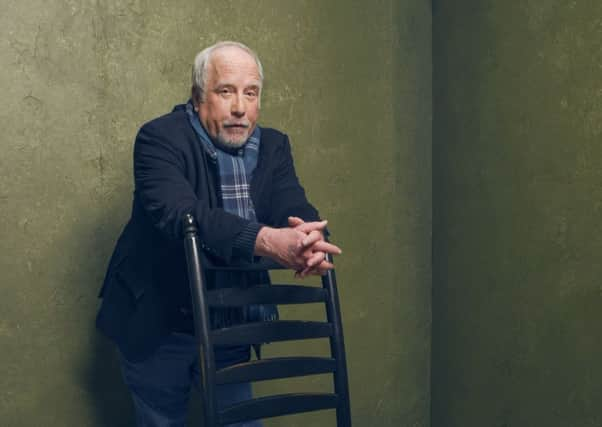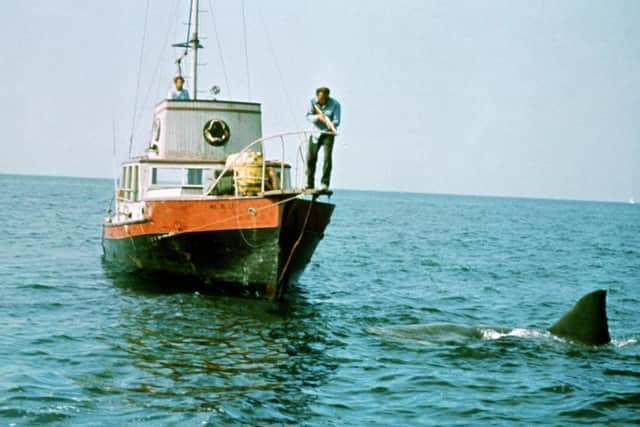Richard Dreyfuss revisits Jaws as film turns 40


RICHARD Dreyfuss is recalling his last significant encounter with a shark. “I was in the Galapagos Islands, I was scuba diving, and my scuba partner went like this…” – he points over his shoulder – “and I turned and there were 150 hammerhead sharks.” He lets out a laugh. “And then sometime later he went…” – he points over his other shoulder again – “and I turned around and there was a tiger shark. And I thought, ‘He could eat me!’ And I got out of the water. Really fast.”
Though it’s possible he’s joking about all this, Dreyfuss insists he’s felt wary about entering the sea ever since the summer of 1975 when Jaws, the film that briefly made him a superstar, made audiences the world over reluctant to dip their toes in the ocean. The film’s tagline – “You’ll never go in the water again” – was a genius piece of marketing that simultaneously encouraged people to swap the beach for the cinema while conveying the movie’s ability to exploit our most primal fears.
Advertisement
Hide AdIt’s something Dreyfuss, who played marine biologist Matt Hooper, understood well during production. “When we were doing Jaws I researched everything that I could,” he says, “and one day I was trailing my hand in the water on the way to the set and all of a sudden all of the information I had learned coalesced and I shuddered and whipped my hand out.”


Now celebrating its 40th anniversary (Scottish audiences wishing to experience it on the big screen can do so as part of the Glasgow Film Theatre’s Summer Daze season this week), Jaws remains the definitive summer event movie. Not only did it capture the public’s imagination, break box-office records and make Steven Spielberg a household name, it ushered in the blockbuster culture that rules today.
The Jaws shoot has become the stuff of legend. But it was also a proving ground for Dreyfuss, who was 27 at the time, and Spielberg, who was 28. “Steven and I had one thing in common,” Dreyfuss says. “I was the uncrowned prince of the actors; even when I was a teenager, they knew I was going to make it. And Steven was the uncrowned king of directors. And in that way we related to one another.”
Though they followed Jaws by collaborating on Close Encounters Of The Third Kind (and worked together again on Spielberg’s 1989 film Always), Dreyfuss downplays any notion of being Spielberg’s on-screen alter ego. “Steven is an enormous personality, but I’m not an alter ego. I’m me and Steven is Steven. He’s made a couple of films where he needed me. But Steven’s not a child and in many ways I am. And that’s why I got the part in Close Encounters.”
Indeed, in contrast to Jaws – which he turned down three times before shocking himself into doing it after seeing how bad he was in his other upcoming movie, The Apprenticeship Of Duddy Kravitz – Dreyfuss lobbied Spielberg hard for the part of alien-believer Roy Neary, even bad-mouthing other actors. “I knew it was going to be a noble film that would be watched for years,” he says, “so I would pass [Spielberg’s] office and say: ‘Al Pacino’s crazy’; ‘Gene Hackman’s too old’; ‘Hoffman’s not funny’. And then one day I said: ‘Steven, you need a child.’ Because only a child could leave his wife and children and not look back – and he said: ‘You got the part.’”
Close Encounters consolidated the commercial and artistic success of Jaws for both Spielberg and Dreyfuss, who followed it up with a best actor Academy Award win the same year for The Goodbye Girl. But the shark movie’s impact would be felt for years to come in other ways. Its status as the first film to break $100m at the American box office, Universal’s hype-generating media blitz, the theme park rides, even the way Spielberg and his team analysed the test-screening results to get more jumps into the final film – these were all things the other studios zeroed in on as they tried to crack the code for blockbuster success.
Advertisement
Hide AdThat this has, in the years since, often been to the detriment of story and character is one of the sadder aspects of the Jaws legacy, but that can’t detract from the quality of the film itself. Or from Spielberg, who at the time worried so much about being regarded as an exploitation hack he worked hard to make Jaws feel as dramatically authentic as The Godfather.
“The 1970s were a golden age,” says Dreyfuss. “Guys made the films they wanted to make and then the corporate thing took over. I knew it. We all knew it. But I was really lucky to be there.”
Advertisement
Hide AdDreyfuss reckons he got too much too soon in the wake of Jaws. His Oscar win at 30, for instance, robbed him of some of his ambition. “I won that award far too early because I’m built for the hunt,” he says. “I’m not built to achieve something. I’m built to try and get it.”
This wasn’t helped by what he calls his “years of being a lowdown dirty dog”, when substance abuse and bad behaviour took hold. “I was a yeller and a screamer and a drug-taker,” he says. “And I was drinking and having sex with people I shouldn’t have been having sex with. It lasted for about two or three years and then I stopped it because it wasn’t me.”
The wake-up call was a car crash in 1982. He wrapped his Mercedes around a palm tree after an argument with a studio executive. He knows he’s lucky to be alive. And not in prison. Even so, this wasn’t enough to completely sober him up. Ten days later he was at a party in Malibu. “I was doing drugs and this one girl made a mistake in letting me see behind her eyes how much she hated herself, and I had this realisation: what am I doing? And I walked out and never did it again. That was it.”
Though he made a comeback with the likes of Stand By Me and Mr Holland’s Opus, he says his relationship with acting has changed and, over the past decade or so, he’s stepped away from it to devote more time to running his non-profit Dreyfuss Civics Initiative. “The thing that has always moved me is how much I loved acting as an urgent thing,” he says. “I used to say there was a nuclear pellet in my chest and then, after 40 years, it turned into a friendship. It was not urgent any more, so I didn’t have to do it. It was still fun. But I found that there was something else that was just as important, and however pompous this might sound, it was saving my country.”
Jaws screens at the Glasgow Film Theatre on Tuesday, tickets at www.glasgowfilm.org